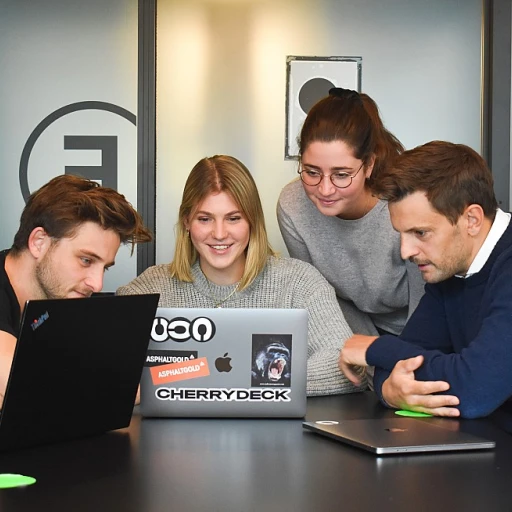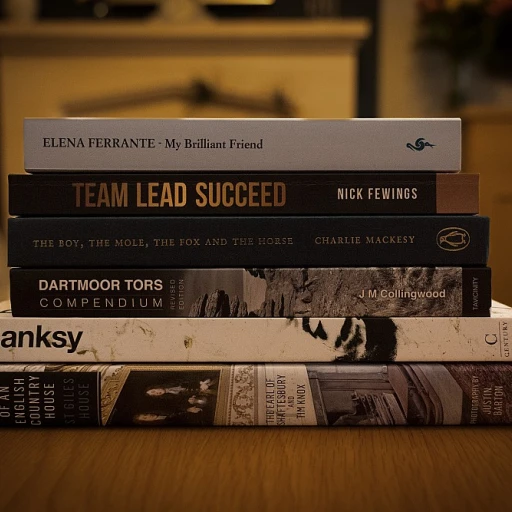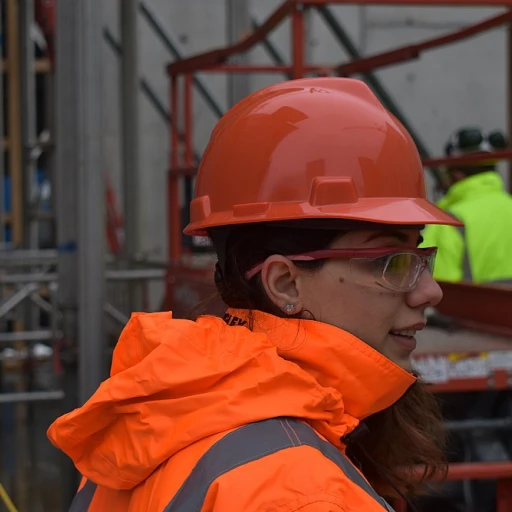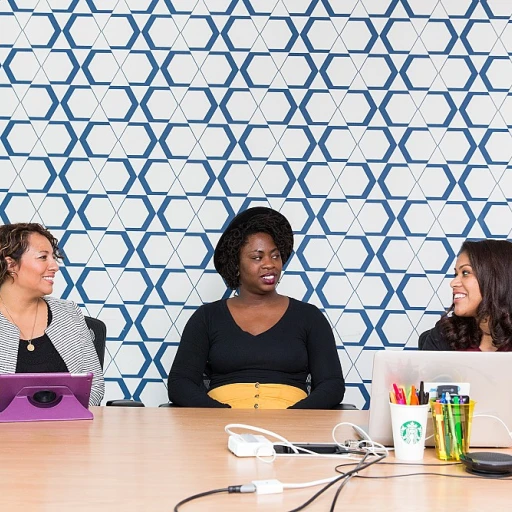Understanding the Role of HR in Interviews
Grasping the HR Interview Role
HR professionals play a pivotal role in the interview process. It’s not just about filling a vacancy; it’s about finding the right fit for the company culture and ensuring the candidate has the skills and experience needed to excel. This responsibility requires a keen understanding of both the job requirements and the human element involved in interviewing.
Think of HR as the bridge between the company and the candidate. You’re not only assessing a candidate's qualifications but also providing them with a positive experience that reflects well on the company. This involves clear communication and active listening, ensuring candidates feel heard and valued throughout the process.
Connecting with Hiring Managers
Collaboration with hiring managers is crucial. They provide insight into the specific skills and experience required for the role, which helps in crafting effective interview questions. By working closely with them, HR can ensure that the interview process aligns with the company’s goals and expectations.
It’s essential to maintain open lines of communication with hiring managers. Regular meetings can help clarify expectations and keep everyone on the same page, reducing any potential misunderstandings or miscommunications.
Setting the Stage for Success
Preparation is key. Before the interview, review the candidate’s resume and any other relevant materials. This will help you ask informed questions and assess the candidate effectively. Consider the type of interview that will best suit the role, whether it’s a competency-based interview, a video interview, or another format.
Remember, the goal is to create a comfortable environment where candidates can showcase their skills and experience. By being well-prepared and approachable, you set the stage for a successful interview process.
Crafting the Perfect Interview Questions
Creating Questions That Hit the Mark
Crafting questions for interviews can feel like an art form. The goal is to uncover the candidate's skills and potential fit for the role. It's not just about asking the right questions; it's about asking them in the right way. Open-ended questions are a great tool here. They encourage candidates to share more about their experiences and thought processes. For example, instead of asking, "Do you have experience in team management?" try "Can you tell me about a time you led a team through a challenging project?" This invites the candidate to provide insights into their problem-solving and leadership skills.Balancing Structured and Conversational Styles
While it's important to have a structured set of interview questions, don't forget to leave room for conversation. This balance helps in making the interview process less rigid and more engaging for the candidate. It also allows you to adapt based on the candidate's responses, providing a better understanding of their personality and how they might fit into the company culture.Aligning Questions with Company Goals
Every company has its unique goals and culture. Your interview questions should reflect this. If your company values innovation, ask candidates about their experience with creative problem-solving. If teamwork is crucial, focus on questions that explore their ability to work collaboratively. This approach not only assesses the candidate's skills but also their alignment with the company's values and objectives.Using Behavioral Questions to Dig Deeper
Behavioral interview techniques are a powerful way to assess how candidates have handled situations in the past, which can be a predictor of future performance. Questions like "Describe a time when you had to deal with a difficult colleague" or "Give an example of a goal you reached and how you achieved it" help you understand the candidate's competencies and soft skills. These types of questions provide a window into the candidate's past behaviors and decision-making processes.Ensuring Fairness and Consistency
It's crucial to maintain fairness and consistency in your interview process. This means asking all candidates the same core questions, which ensures that each candidate is evaluated on the same criteria. This not only helps in making objective hiring decisions but also provides a positive candidate experience. Remember, the interview is as much about the candidate assessing the company as it is about the company assessing the candidate. For more insights on mastering HR interviews, check out our guide on HR interviews for recruitment roles.Building Rapport with Candidates
Strengthening Connections with Job Seekers
Building rapport with candidates is more than just polite small talk during job interviews. It's about creating a comfortable space where they feel valued and heard, as if they're conversing with a friend who's genuinely interested in their journey. This involves more than just a nod and smile; it's about engaging in active listening—truly tuning into what candidates are expressing, both verbally and through their body language. Imagine a scenario where a candidate, let's call her Sarah, is visibly nervous. As an interviewer, acknowledging her anxiety and perhaps sharing a light-hearted personal story about your own first interview can break the ice. Suddenly, Sarah feels at ease, more apt to open up about her skills and experience, enhancing your ability to assess her fit for the job role. Candid interviews allow you to tap into authentic experiences that drastically improve the candidate experience. And when the interview questions are designed to be open-ended, you provide candidates the chance to elaborate and share deeper insights into their work history and problem-solving capabilities. For example, instead of asking, "Do you have experience with customer service?" try "Can you share a time when you turned around an unsatisfied customer?" This not only provides context, but also offers a window into their communication skills and capacity for creativity.Creating a Genuine and Relaxed Atmosphere
Hiring managers can often underestimate the impact of a relaxed atmosphere in an interview setting. Human resources professionals know the truth about this subtle art: it's half of what contributes to successful interviews. Figuring out how to be personable, while maintaining professionalism, sets a strong tone for the interview process. Consider the transition from in-person interviews to video formats, which many companies have embraced as part of their recruitment process. The screen shouldn't be a barrier—maintain eye contact, express empathy, and share a bit about the company culture. This provides candidates with a glimpse into what it might be like to work with your company, thereby aligning their expectations with the realities of the role they're applying for. Remember, every step you take to build positive relationships with candidates reflects on your company's overall branding in the talent acquisition world. Consistent, thoughtful interactions ensure that even candidates who aren't selected still leave the interview process with a favorable impression of your company. For further tips on crafting a solid base for your interview strategy, you might want to explore this guide to perfecting HR interviews for entry-level roles. This resource provides more insights into creating engaging interactions tailored to all experience levels."}Assessing Soft Skills Effectively
Evaluating Those Hard-to-See Skills
When it comes to hiring, assessing a candidate's soft skills can be like trying to catch smoke with your bare hands. These skills, such as communication and problem solving, are crucial for fitting into the company culture and excelling in the role. Yet, they often slip through the cracks during the interview process.
Soft skills are the secret sauce that can make or break a candidate's success in your company. They aren't just about being a good talker or a team player; they're about how a person navigates challenges and builds relationships. So, how do you assess these skills effectively during interviews?
Listen More Than You Talk
Active listening is your best friend here. Pay attention not just to what the candidate says, but how they say it. Are they concise and clear? Do they show empathy and understanding? These are indicators of strong communication skills. Remember, the best interviewers are those who listen more than they talk.
Ask the Right Questions
Open-ended questions are your go-to tool. Instead of asking, "Are you good at problem solving?" try something like, "Can you tell me about a time you had to solve a difficult problem at work?" This gives candidates the chance to share specific experiences and demonstrate their skills in action.
Behavioral Interview Techniques
Behavioral questions are a goldmine for assessing soft skills. They focus on past experiences to predict future behavior. Questions like, "Describe a situation where you had to work with a difficult team member," can reveal a lot about a candidate's interpersonal skills and resilience.
Observe Non-Verbal Cues
Non-verbal communication can be just as telling as verbal. Watch for body language, eye contact, and facial expressions. These can provide insights into a candidate's confidence and how they might interact with colleagues.
Consider the Candidate Experience
The interview process isn't just about you assessing the candidate; it's also about them assessing your company. Providing a positive experience can help you attract top talent. Be respectful of their time and communicate clearly throughout the process.
By focusing on these aspects, you'll be better equipped to assess candidates' soft skills and find the right fit for your team. Remember, the goal is to understand how a candidate's skills and experience align with your company's needs and culture.
Utilizing Behavioral Interview Techniques
Getting the Best Out of Behavioral Interviews
Behavioral interviews are like peering into a crystal ball for HR recruiters. They help you predict how a candidate might perform in the future based on past behavior. This technique is a goldmine for understanding a candidate's skills and experience. Let's break it down to make sure you’re getting the most out of it.
First, think about the interview questions you ask. They should be open-ended, allowing candidates to share stories about their past work experience. Questions like, "Can you tell me about a time when you had to solve a problem under pressure?" or "Describe a situation where you had to work with a difficult team member," can provide valuable insights into a candidate's problem-solving and communication skills.
Active Listening: The Secret Sauce
Once you’ve asked the right questions, the next step is to practice active listening. This means truly hearing what the candidate is saying, not just waiting for your turn to speak. Pay attention to the details in their stories. Are they giving specific examples? Are they taking responsibility for their actions? This will help you assess the candidate's soft skills and determine if they’re a good fit for the role and company culture.
It’s also important to watch for non-verbal cues. Body language can tell you a lot about a candidate’s confidence and honesty. Are they maintaining eye contact? Are they fidgeting? These signals can be just as telling as the words they use.
Video Interviews: A Modern Twist
In the age of remote work, video interviews have become a staple in the recruitment process. While they offer convenience, they also come with their own set of challenges. Ensure your technology is up to par to avoid any hiccups during the interview. Remember, the candidate experience is just as important as the interview itself.
When conducting video interviews, make sure to set a professional tone. Dress appropriately, and choose a quiet, well-lit space. This not only shows respect for the candidate but also sets the stage for a productive conversation.
Feedback: A Two-Way Street
Finally, provide feedback to your candidates. Whether they get the job or not, offering constructive feedback can enhance their experience and reflect well on your company. It’s a chance to show that your company values transparency and growth.
By mastering behavioral interview techniques, you can improve your hiring process and make more informed decisions. This approach not only helps in assessing the right skills but also ensures that you’re bringing in talent that aligns with your company’s values and goals.
For more insights on crafting the perfect interview questions, check out our guide on mastering HR interviews for recruitment roles.
Overcoming Common Interview Challenges
Handling the Unexpected During Interviews
Every interviewer has faced those moments when the interview doesn't go as planned. Maybe the candidate is nervous, or perhaps the questions don't elicit the responses you expected. It's important to be flexible and adapt to these situations.
Start by practicing active listening. This skill helps you understand the candidate's point of view and can guide the conversation back on track. If a candidate seems stuck, try rephrasing the question or offering a related example from your own experience. This not only helps the candidate but also showcases your communication skills.
Dealing with Discrepancies in Experience
Sometimes, candidates may present experiences that seem exaggerated or inconsistent. It's crucial to address these without appearing confrontational. Ask open-ended questions that encourage the candidate to provide more details. This can help clarify any misunderstandings and assess the candidate's true skills and experience.
For example, if a candidate claims to have led a project but their role seems unclear, you might say, "Can you walk me through your specific responsibilities in that project?" This approach allows the candidate to elaborate and provides you with a clearer picture of their role.
Managing Time During Interviews
Time management is a common challenge. Interviews can easily run over time, especially if you're engaged in an interesting conversation. To keep things on track, outline a clear structure for the interview process beforehand. Allocate time for each section and stick to it as closely as possible.
If you find yourself running out of time, prioritize the most important questions. Remember, the goal is to assess the candidate effectively, not to rush through every question on your list.
Maintaining Consistency Across Interviews
Consistency is key when interviewing multiple candidates for the same role. It ensures fairness and makes it easier to compare candidates later. Develop a set of core questions that you ask every candidate. This doesn't mean you can't explore unique experiences, but having a baseline helps maintain a fair assessment process.
Utilize competency-based questions to evaluate skills and experiences consistently. These questions focus on how candidates have handled past situations, which can be a reliable predictor of future performance.
Creating a Positive Candidate Experience
Lastly, remember that the interview is a two-way street. While you're assessing candidates, they're also evaluating your company. Providing a positive candidate experience can enhance your company's reputation and attract top talent.
Ensure the interview process is smooth and respectful. Communicate clearly about the next steps and provide feedback when possible. This leaves candidates with a good impression, regardless of the outcome.








